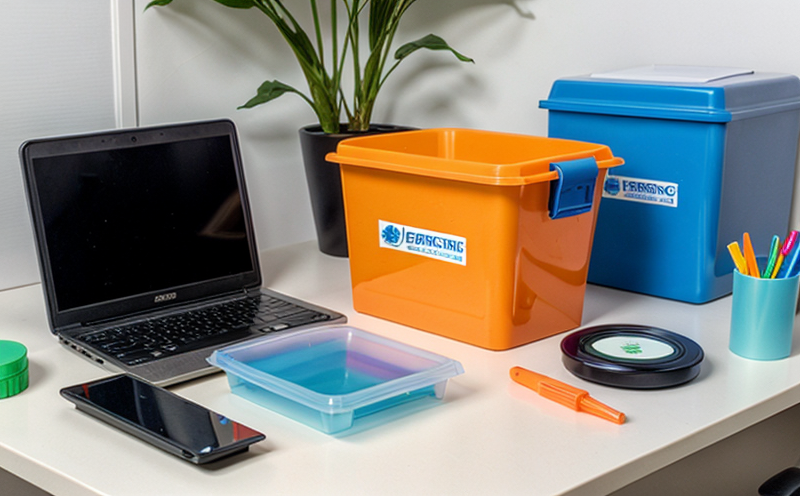BS EN 1040 Bactericidal Activity Testing of Plastic Office Surfaces
The BS EN 1040 standard is designed to evaluate the bactericidal activity of plastic materials intended for use in office and stationery environments. This test is crucial for ensuring that surfaces such as keyboards, mouse pads, desk trays, and other frequently touched items effectively reduce bacterial contamination, thereby promoting a hygienic workspace.
The testing protocol involves exposing the plastic samples to specific bacteria under controlled conditions and then assessing their ability to inhibit bacterial growth. The standard outlines rigorous procedures and acceptance criteria that must be met for the material to pass the test.
Specimen Preparation: Specimens are typically cut from the actual office surfaces or fabricated into standardized shapes for testing. It is important to ensure that the samples accurately represent the intended use in an office environment.
The bactericidal activity is measured by comparing the bacterial load before and after exposure to the test material. The standard specifies the types of bacteria used (e.g., Escherichia coli, Staphylococcus aureus) and the time periods for which they are exposed.
Instrumentation: A variety of instruments may be required depending on the specific aspects being tested. These include incubators, bacterial growth media, and analytical equipment to quantify bacterial counts before and after exposure.
The results are reported in terms of the percentage reduction in bacterial colony-forming units (CFUs) per square meter or per gram of material exposed. Compliance with this standard ensures that surfaces meet strict hygiene standards necessary for office environments.
Why Choose This Test:
- It guarantees compliance with international standards.
- Absolutely critical for maintaining a hygienic workspace in offices and other public spaces.
- Ensures long-term durability of the plastic material by preventing bacterial growth, which can lead to degradation over time.
Acceptance Criteria:
- The reduction in CFUs must exceed a specified threshold for the test to pass.
- The test results are compared against baseline data from non-sterilized samples.
This testing is essential for manufacturers and suppliers of office plastics, as it ensures that their products meet stringent hygiene requirements. Compliance with this standard can significantly enhance the reputation of a product in the market, giving it a competitive edge over non-compliant alternatives.
The testing process not only ensures hygiene but also contributes to public health by reducing the spread of harmful bacteria in office environments. This is particularly important given the increasing awareness about workplace hygiene and its impact on employee well-being.
Eurolab Advantages
EuroLab, your trusted partner for polymer & plastics testing, offers a comprehensive suite of services tailored to meet the unique needs of manufacturers and suppliers in the office stationery sector. Our expertise lies in providing accurate, reliable, and timely test results that are essential for maintaining compliance with international standards.
With our state-of-the-art facilities and experienced staff, we ensure that every test adheres strictly to the BS EN 1040 standard. This guarantees that your products not only meet but exceed customer expectations in terms of hygiene and durability.
Why Choose Us:
- Comprehensive range of services covering all aspects of polymer & plastics testing.
- Expertise and experience in the office stationery sector, ensuring accurate and relevant test results.
- Use of cutting-edge technology and methodologies to deliver precise and reliable outcomes.
We understand the importance of meeting stringent hygiene standards in the office environment. Our dedicated team works closely with clients to ensure that every step of the testing process is conducted with precision and care. This commitment to quality ensures that your products are not only compliant but also trusted by end-users.
Why Choose This Test
The BS EN 1040 bactericidal activity test is a critical component of ensuring the hygiene and safety of office environments. By choosing this test, you are making a significant investment in maintaining a clean, healthy workspace for employees and visitors alike.
- It ensures that your products meet the highest international standards.
- Reduces the risk of bacterial contamination and subsequent health issues.
- Enhances customer trust and satisfaction, leading to increased market share.
- Achieves long-term durability by preventing bacterial growth on plastic surfaces.
The test is particularly beneficial for manufacturers and suppliers of office plastics, as it ensures that their products meet strict hygiene requirements. This can significantly enhance the reputation of a product in the market, giving it a competitive edge over non-compliant alternatives.
Compliance with this standard not only guarantees high-quality products but also contributes to public health by reducing the spread of harmful bacteria in office environments. This is particularly important given the increasing awareness about workplace hygiene and its impact on employee well-being.
Competitive Advantage and Market Impact
The BS EN 1040 bactericidal activity test provides a clear competitive advantage in the office stationery sector. By ensuring that your products meet or exceed international standards, you can differentiate yourself from competitors who may not prioritize hygiene.
- Enhances customer trust and satisfaction, leading to increased market share.
- Attracts health-conscious customers seeking high-quality, hygienic products.
- Builds a positive brand image that resonates with environmentally conscious consumers.
In the highly competitive office stationery market, compliance with this standard can be a significant differentiator. It demonstrates your commitment to quality and safety, which are critical factors for customers when making purchasing decisions.
The test also has broader market impacts by contributing to public health initiatives aimed at reducing workplace infections. By promoting hygienic practices in office environments, you play a role in maintaining overall public health standards.





